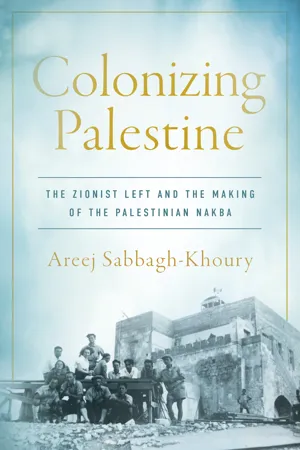
Colonizing Palestine
The Zionist Left and the Making of the Palestinian Nakba
- 376 pages
- English
- ePUB (mobile friendly)
- Available on iOS & Android
About this book
Among the most progressive of Zionist settlement movements, Hashomer Hatzair proclaimed a brotherly stance on Zionist-Palestinian relations. Until the tumultuous end of the British Mandate, movement settlers voiced support for a binational Jewish-Arab state and officially opposed mass displacement of Palestinians. But, Hashomer Hatzair colonies were also active participants in the process that ultimately transformed large portions of Palestine into sovereign Jewish territory. Areej Sabbagh-Khoury investigates this ostensible dissonance, tracing how three colonies gained control of land and their engagement with Palestinian inhabitants on the edges of the Jezreel Valley/Marj Ibn 'Amer.
Based on extensive empirical research in local colony and national archives, Colonizing Palestine offers a microhistory of frontier interactions between Zionist settlers and indigenous Palestinians within the British imperial field. Even as left-wing kibbutzim of Hashomer Hatzair helped lay the groundwork for settler colonial Jewish sovereignty, its settlers did not conceal the prior existence of the Palestinian villages and their displacement, which became the subject of enduring debate in the kibbutzim. Juxtaposing history and memory, examining events in their actual time and as they were later remembered, Sabbagh-Khoury demonstrates that the dispossession and replacement of the Palestinians in 1948 was not a singular catastrophe, but rather a protracted process instituted over decades. Colonizing Palestine traces social and political mechanisms by which forms of hierarchy, violence, and supremacy that endure into the present were gradually created.
Frequently asked questions
- Essential is ideal for learners and professionals who enjoy exploring a wide range of subjects. Access the Essential Library with 800,000+ trusted titles and best-sellers across business, personal growth, and the humanities. Includes unlimited reading time and Standard Read Aloud voice.
- Complete: Perfect for advanced learners and researchers needing full, unrestricted access. Unlock 1.4M+ books across hundreds of subjects, including academic and specialized titles. The Complete Plan also includes advanced features like Premium Read Aloud and Research Assistant.
Please note we cannot support devices running on iOS 13 and Android 7 or earlier. Learn more about using the app.
Information
Table of contents
- Cover
- Title Page
- Copyright
- Series Page
- Dedication
- Contents
- Note on Translation and Transliteration
- Preface
- Acknowledgments
- Introduction
- 1. People, Land, and Property: Settler Colonial Process in Bilad al-Ruha
- 2. Colonialism by Purchase: Possession, Expulsion, and Replacement
- 3. Encounters on the Settler Colonial Frontier: Kibbutz Relations with Neighboring Palestinian Villages
- 4. From Purchase to Warfare: Relations between Kibbutz Settlers and Neighboring Palestinians during the 1948 Events
- 5. Settler Colonial Memory: Between Recognizing and Disavowing
- 6. Representations of 1948: From Official Representation to Controversial Memory
- Conclusion
- Notes
- Bibliography
- Index
- Series List